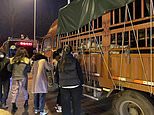Hundreds of puppies saved from cages in Chinese ‘truck from hell’ with adult dogs set to be eaten
Rescued from the ‘truck from hell’: Hundreds of whimpering puppies are saved from cramped cages in a Chinese lorry along with adult dogs destined to be served as food
Nearly 300 caged dogs including 262 puppies saved from meat and pet tradeSome already died on the 1,000-mile journey before ‘truck from hell’ was haltedActivists spotted van and called cops, who took dogs to shelter and vets for carePups were in such bad health more than a dozen died within hours of rescueMany surviving dogs are suffering from dehydration, starvation and skin diseaseWARNING: GRAPHIC CONTENT
<!–
<!–
<!–<!–
<!–
(function (src, d, tag){
var s = d.createElement(tag), prev = d.getElementsByTagName(tag)[0];
s.src = src;
prev.parentNode.insertBefore(s, prev);
}(“https://www.dailymail.co.uk/static/gunther/1.17.0/async_bundle- -.js”, document, “script”));
<!–
DM.loadCSS(“https://www.dailymail.co.uk/static/gunther/gunther-2159/video_bundle- -.css”);
<!–
Hundreds of dogs including 262 puppies were saved when a ‘truck from hell’ taking them to slaughterhouses and traders was stopped by police.
The starving, dehydrated puppies were set to be sold as pets on China‘s thriving dog market, with adult dogs expected to be turned into dog meat and eaten.
Activists in Anhui, eastern China spotted the van and alerted police, who confiscated the dogs and took them to a local animal shelter for urgent treatment.
The vehicle, which activists described as the ‘truck from hell’ was filmed shortly before it was pulled over – and its 282 dogs confiscated by police. They were rushed to vets for treatment
Activists surround the truck on the highway, where it was pulled over without official papers
The truck had travelled 1,000 miles before it was stopped by police. Its driver didn’t have the documents required to legally transport live animals across provincial borders
Apple (pictured) suffered a skin condition causing hair loss. He sadly died after the rescue
Hundreds of tightly caged pups were forced to undergo a grueling 10,000-mile road journey
Vshine volunteer Leng (pictured) said he never expected there to be so many puppies onboard
They had already travelled 1,000 miles from Guizhou to Huainan – and 12 puppies had died along the way.
Police confiscated the dogs when the driver was unable to present official papers. It’s not clear whether the driver was taken into custody.
Since the rescue, a further 18 dogs have died from highly contagious diseases parvovirus and distemper.
Many surviving puppies are suffering from dehydration, starvation and heart disease.
One of the puppies, who lead volunteer Teng named Apple, suffered a skin condition causing distinct hair loss on his tiny forehead.
Teng promised to adopt Apple if he survived – but, after hours of emergency treatment, the adorable pup sadly died.
Many of the adorable pups were piled on top of each other in tiny boxes, striking images show
Although hundreds of dogs and puppies were saved, 12 were already dead and more have died
Volunteers at a local animal shelter were able to save many stricken dogs, but not all survived
Teng said: ‘I knew it was going to be bad because there were so many dogs crammed inside, but I hadn’t expected there to be so many tiny puppies.
‘I noticed little Apple right away because he had lost so much fur, and my heart just melted.
‘I wanted to do everything I could to make it up to him so that he could forget his horrible ordeal, but his suffering had just been too much. I’m so sad for all the ones like Apple who didn’t make it.
Humane Society International’s Chinese partner Vshine led the rescue effort and will rehouse the surviving dogs at their shelter, which receives funding from HSI.
The global charity’s China specialist Dr Peter Li said: ‘This sad story is all too common in China, where hundreds of thousands of dogs and cats evert month endure appalling suffering like this in order to make profit for the meat and pet trades.
‘The condition of these dogs was so terrible that it’s likely many more would have died before they reached their intended destination, and sickly puppies would probably have been sold for meat just like the adult dogs.
The Yulin Dog Meat Festival, where thousands are killed each year, is still legal despite outcry
‘Thank goodness for the Chinese animal activists and police who saved so many lives.’
Although some Chinese cities have banned the consumption of dog and cat meat, it remains legal in many parts of the country.
In 2020, the Ministry of Agriculture and Rural Affairs said dogs are pets, not ‘livestock’ – yet more than a quarter of the Chinese population still regularly eats dog, HSI said.
This is far from the first time such a rescue has been completed. Last July, 68 animals were saved on their way to slaughter at the Dog Meat Festival in Yulin, China.
![]()


